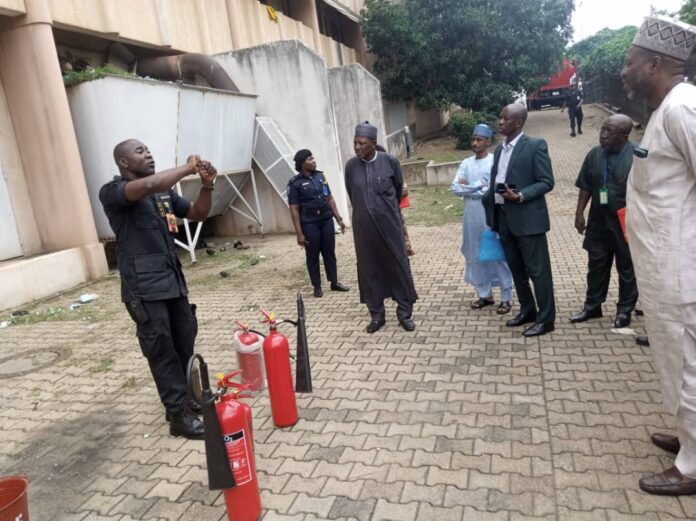The Permanent Secretary, Federal Ministry of Humanitarian Affairs, Disaster Management and Social Development, Dr. Nasir Sani-Gwarzo, mni, NPOM, has said that Disaster Risk Reduction is a collective business of all citizens of the country.
He stated this at the In-House Fire Awareness/ Prevention Training Programme organised by the Humanitarian Affairs department of the Ministry, for its Management Cadre, held at the Federal Secretariat, Abuja.
Represented by the Director Humanitarian Affairs Department, Alhaji Ali Grema, the Permanent Secretary stated that the in- house fire drill and exercise was organised by the department in collaboration with the Federal Fire Service as part of the Humanitarian Affairs Department’s responsibility to raise awareness on mitigation and prevention of disaster risks in work places.
The Permanent Secretary emphasised that fire safety awareness campaigns help to prevent loss of lives and properties due to fire hazards ” It helps in identifying basic fire equipment and types or classes of fires as well as identify escape/evacuation routes, methods of storing flammable items in homes and work places and assistance to render in case of fire incidences.
“It is worth reminding that Nigeria has had many incidences of fire hazards in homes and work places putting thousands at risks of losing lives and properties. The demonstrations on how to use various fire equipment will come handy in an emergency situation in order to mitigate hazards/ disasters” he added.
The Resource Person, Superintendent of Fire, Manu Sunday, took the participants through the theory and practical sections. He said the objective of the training is to acquaint participants with the different classes of fire, fire extinction, types of extinguishers and their uses.
He said for a fire to occur, there are certain elements that must be present in the right proportion such as heat, oxygen and fuel (The Fire Triangle) and extinguishing fire depends on the cause of the fire and methods of extinguishing fire includes starvation, smouldering, cooling and inhibition.
He mentioned that fire fighting equipment includes passive and active protection. He gave examples of different types of extinguishers and explained their features.
Sunday said extinguishers have expiring dates of six months after which it must be replaced, refilled or serviced.
During the practical section, the Fire Service Officers demonstrated how to use fire fighting equipment and participants had physical experience of using fire extinguishers and blankets.
Dr. Nasir Sani-Gwarzo, mni, NPOM
Permanent Secretary
Federal Ministry of Humanitarian Affairs, Disaster Management and Social Development






